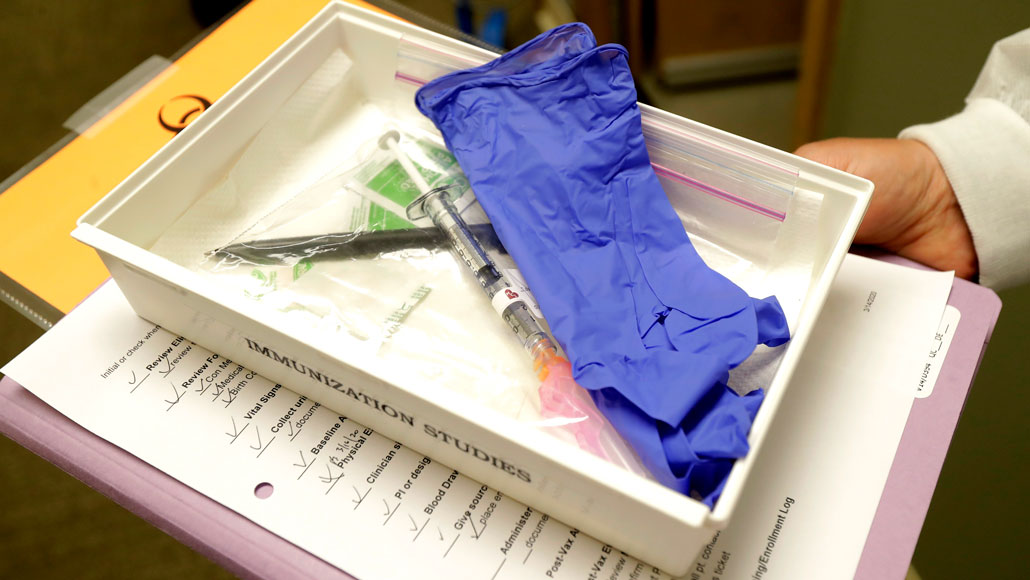Meet Sophia Upshaw, a volunteer in a coronavirus vaccine trial
Nearly 50 people in Seattle and Atlanta have begun receiving injections of a potential vaccine

As part of initial safety tests, volunteers in Seattle and Atlanta have begun receiving injections of a potential COVID-19 vaccine.
Ted S. Warren/AP Photo
Scientists are racing to develop and test vaccines that can protect people from the coronavirus. One particularly swift effort, sponsored by the National Institute of Allergy and Infectious Diseases, involves a vaccine called mRNA-1273, made by pharmaceutical company Moderna, Inc., in Cambridge, Mass.
Traditional vaccines use a weakened or inactive version of viruses or their parts to spark an immune response. In contrast, mRNA-1273 contains genetic material called messenger RNA, which carries instructions for making one of the coronavirus’s proteins. The idea is that human cells will take those instructions and make this viral protein. Then, the body will learn how to produce antibodies that target the protein, jump-starting an immune reaction against the real thing, should it ever be encountered (SN: 2/21/20).
Two research sites — Kaiser Permanente Washington Health Research Institute in Seattle and Emory University’s Vaccine and Treatment Evaluation Unit in Atlanta — have begun testing the safety of the vaccine in 45 participants.
Science News spoke to Sophia Upshaw, a 22-year-old graduate student in Atlanta who recently received the first of two doses of the experimental vaccine. She’ll have regular clinic visits for the duration of the study, which will last about 14 months. Her responses have been edited for clarity.
SN: Why did you volunteer to participate in the study?
Upshaw: It’s something that I could do. We are all feeling helpless, and trying to help in any way we can, whether it’s donating masks or 3-D printing masks or volunteering at the hospital if you’re a nurse. Everyone is trying to do what they can.
SN: How did you hear about the study, and how quickly were you enrolled?
Upshaw: I heard about it the week of March 16 from some other labs. I called and asked if I could be screened for the study on March 20, and I came in for my first screening on the 23rd. Wednesday, [the 25th], is when they approved me for the study, and then Friday the 27th is when I got my first vaccination. It was very quick.

Trustworthy journalism comes at a price.
Scientists and journalists share a core belief in questioning, observing and verifying to reach the truth. Science News reports on crucial research and discovery across science disciplines. We need your financial support to make it happen – every contribution makes a difference.
SN: Did the shot hurt?
Upshaw: The pain was very similar to when you get a flu shot. I felt the pinch and the burn as they were injecting it. Then they took it out, and I said, “Oh, that’s it?” My shoulder was sore for the whole day. The soreness developed throughout the day. On April 24th, I have my second injection.
SN: Are there risks you’re worried about?
Upshaw: One of the big risks is the possibility of developing symptoms similar to COVID. That was one big worry that I had. But this particular vaccine doesn’t have the actual inactive virus. It has genetic material that [carries instructions] for a protein that’s found on the virus. It basically tricks your body into thinking you have it.
I’m still slightly worried. Today is day nine or 10 now after the first injection, and I’m feeling fine. I was borderline feverish, but I never reached the threshold for a medical-grade fever.
SN: How does your family feel about your participation?
Upshaw: They were really worried, but they call and check in on me every day to see how I’m doing. They’re a lot more comforted and relaxed now that they see I haven’t [developed complications]. They are happy that people are choosing to participate in the trial. They’re just not happy that it’s me.
SN: Anything else you’d like to share?
Upshaw: A lot of people are wondering why there isn’t a vaccine yet. I saw a lot of that on social media — people wondering how long it’s going to take. I think part of the reason I want to share my story is to tell people, “Hey, people are trying their best.”
It’s a different perspective to see the doctors and nurses involved in the vaccine trial and how hard they’re working. It’s amazing to see their dedication to this. This has dominated their work right now. I’m really appreciative of their work, and how well they’ve treated me and everyone in the vaccine trial to make us feel comfortable.… I’m very grateful to be a part of [the trial]. We’ll see how things turn out in a year or so. That seems like a long way away.
Sign up for our newsletter
We summarize the week's scientific breakthroughs every Thursday.







